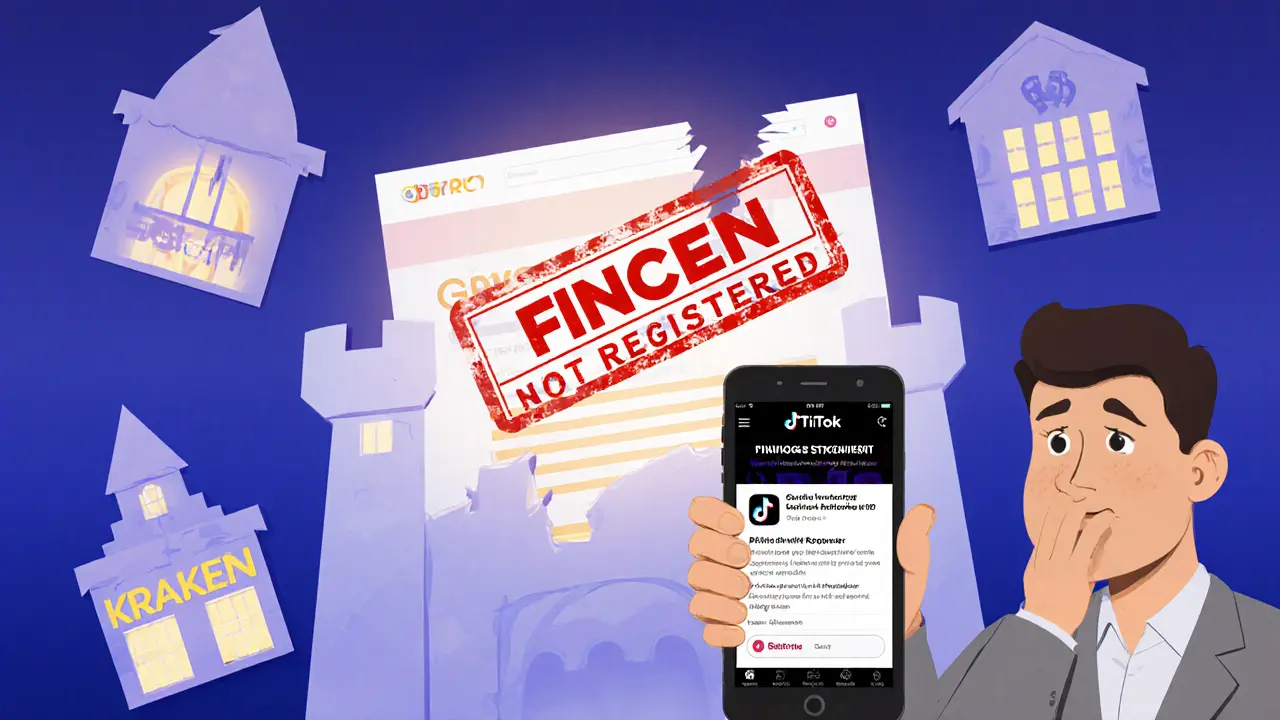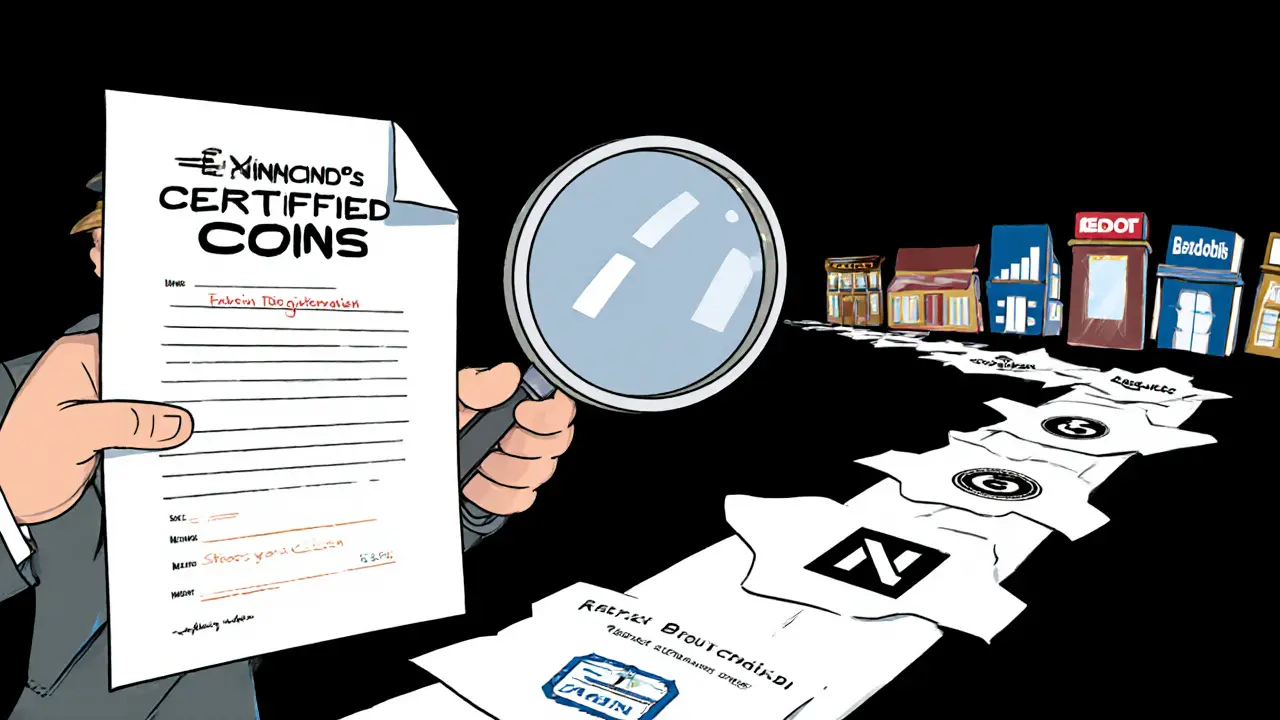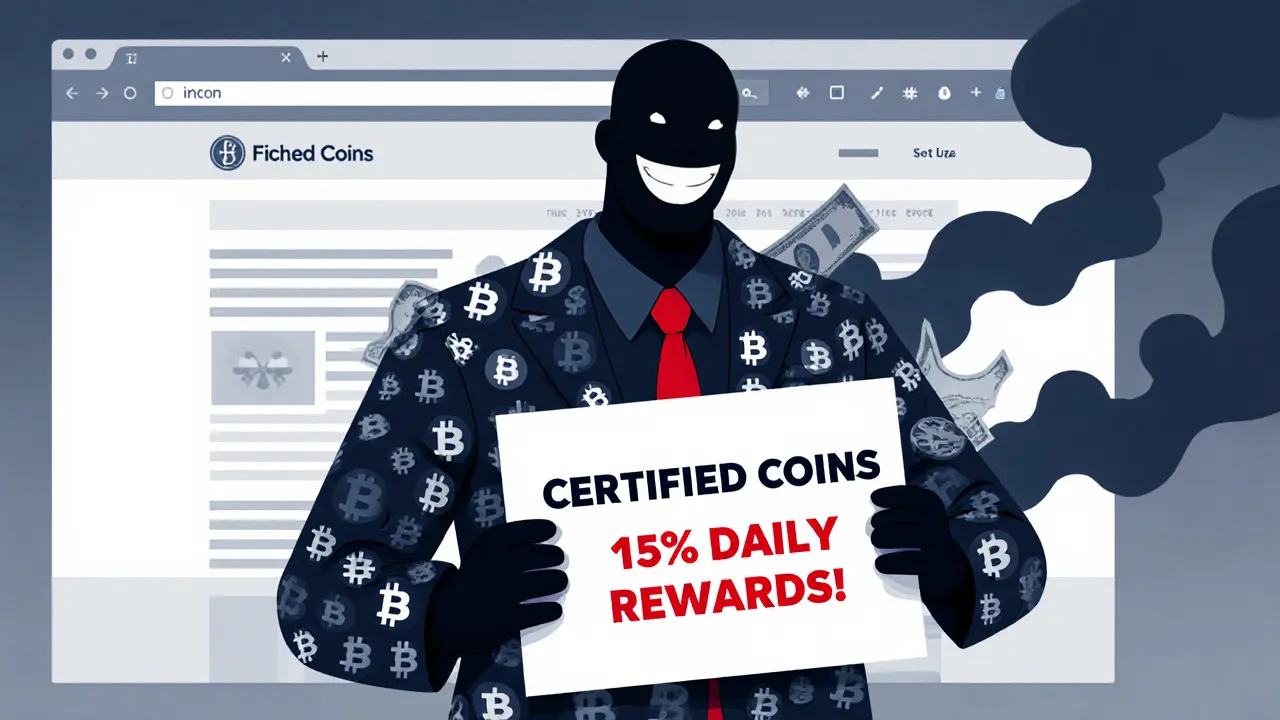Crypto Exchange Legitimacy Checker
Check Exchange Legitimacy
Enter a crypto exchange name to verify if it's legitimate or a scam. This tool checks against U.S. regulatory requirements and known legitimate platforms.
Results
There’s no such thing as a crypto exchange called Certified Coins. Not now. Not ever. If you’ve seen ads, social media posts, or YouTube videos pushing this name, you’re being targeted by a scam.
Every major crypto review site - Coin Bureau, Koinly, Money.com, and even Reddit’s r/CryptoCurrency - lists the same top exchanges: Coinbase, Kraken, Binance US, Gemini, Crypto.com. None mention Certified Coins. Not once. Not in a forum thread. Not in a security report. Not even as a footnote. That’s not an oversight. It’s a red flag.
What Is Certified Coins, Really?
You might be confused because you’ve heard the phrase "certified coins" in relation to blockchain standards. That’s not an exchange. That’s a technical term. Some cryptocurrencies, like XRP, XLM, and IOTA, follow the ISO 20022 financial messaging standard. This lets them communicate better with banks and traditional payment systems. It’s about data format, not brand names.
Scammers know people mix up terms like this. They take "certified coins," slap it onto a fake website, and make it look official. They use logos that mimic real exchanges. They copy-paste reviews from Coinbase or Kraken. They even hire actors to pretend to be "users" in YouTube testimonials. The goal? Get you to deposit money. Then vanish.
How to Spot a Fake Crypto Exchange
Legitimate exchanges don’t hide. They’re registered with U.S. regulators. They have public company histories. They’re covered by major financial news outlets. Here’s how to tell if an exchange is real:
- Check FinCEN registration - All legal U.S. crypto exchanges must be registered as Money Services Businesses. Go to FinCEN’s website and search for the company name. If it’s not there, it’s illegal.
- Look for SEC compliance - After the 2023-2024 crackdown, exchanges like Coinbase and Kraken cut down their coin listings to stay compliant. If an exchange offers 500+ coins with no clear regulatory stance, walk away.
- Search for reviews on Trustpilot and Reddit - Real exchanges have thousands of reviews. Kraken has over 8,200 on Trustpilot. Coinbase has 12,500+ on the App Store. Certified Coins has zero. Not one.
- Check their security claims - Coinbase stores 98% of assets in cold storage. Kraken insures $1.1 billion in hot wallet holdings. If a site says "we’re 100% secure" with no details, that’s a lie.
There’s no record of Certified Coins ever being registered with FinCEN. No press releases. No SEC filings. No job postings. No office addresses. No employees listed on LinkedIn. That’s not a startup. That’s a ghost.

Real Exchanges You Can Trust (2025)
If you’re looking for a safe place to buy crypto, here are the real options - all verified, regulated, and actively used by millions:
| Exchange | Coins Available | Fees (Spot Trading) | Security Rating | Best For |
|---|---|---|---|---|
| Coinbase | 235+ | 0%-3.99% | AAA (CER) | Beginners, education |
| Kraken | 350+ | 0%-0.4% | AAA (CER) | Traders, security |
| Binance US | 158 | 0%-0.1% | A+ | Low fees, volume |
| Gemini | 150+ | 0.4%-0.9% | AAA (CER) | Regulatory compliance |
| Crypto.com | 313 | 0%-0.4% | BB (CER) | Staking, Visa card rewards |
These platforms have been around for years. Kraken launched in 2011. Coinbase in 2012. They’ve survived multiple bear markets, SEC lawsuits, and hacker attempts. They’ve hired compliance teams of over 1,200 people. They’re on NASDAQ. They’re audited. They’re public.
Certified Coins? It doesn’t even have a website that loads properly. Try searching for it. You’ll find sketchy affiliate links. You’ll find fake testimonials. You’ll find nothing else.
Why This Scam Works (And How to Avoid It)
This scam preys on two things: confusion and greed.
People hear "certified" and think "trusted." They assume it’s a new, elite platform with special approval. They don’t realize that in crypto, "certified" doesn’t mean regulated - it’s just a marketing word.
And then there’s the promise of high returns. Fake exchanges often say: "Earn 15% daily staking rewards!" or "Limited access for early users!" Real exchanges don’t promise guaranteed returns. They don’t pressure you. They don’t create fake urgency.
Here’s what you should do instead:
- Use only exchanges listed in this article or reviewed by Coin Bureau, Koinly, or Money.com.
- Never deposit crypto into a site you found through a TikTok ad or a Telegram group.
- Always verify the domain name. Scammers use .xyz, .info, or misspellings like "CertifiedCoins.io" instead of the real .com.
- If you already sent money to Certified Coins, report it to the FTC at reportfraud.ftc.gov. There’s no recovery, but your report helps shut them down.

What Happens When You Get Scammed
Once you send crypto to a fake exchange, it’s gone. Blockchain transactions are irreversible. No customer service line will help you. No lawyer can reverse it. The operators are usually overseas, using stolen identities and burner servers.
The SEC reported 142 crypto exchange spoofing cases in Q3 2025 alone. Most victims lose between $5,000 and $20,000. Some lose more. The average recovery rate? Less than 2%.
And the damage doesn’t stop at money. Many people lose trust in crypto altogether after getting scammed. They think the whole industry is a scam - when in reality, it’s just one small group of criminals exploiting confusion.
Final Warning
If you’re reading this and you’ve already signed up for Certified Coins - stop. Don’t deposit any more money. Don’t share your private keys. Don’t download any app they tell you to install. Take screenshots of the site. Report it. Then delete everything.
There’s no secret elite exchange called Certified Coins. There’s no hidden vault. No special certification. No backdoor access. It’s a trap.
Stick to the real ones. They’re not flashy. They don’t promise miracles. But they’re here to stay. And they’re the only ones that won’t steal your money.
Is Certified Coins a real crypto exchange?
No, Certified Coins is not a real crypto exchange. There is no record of it being registered with FinCEN, the SEC, or any U.S. financial regulator. All major crypto review sites, including Coin Bureau and Koinly, confirm it does not exist as a legitimate platform.
Why do people think Certified Coins is real?
Scammers use the term "certified coins" to confuse people. Some legitimate cryptocurrencies like XRP and XLM follow the ISO 20022 financial standard, which improves banking compatibility. Scammers exploit this technical term to make fake exchanges sound official and trustworthy.
What should I do if I already sent money to Certified Coins?
If you sent crypto to Certified Coins, your funds are likely gone. Blockchain transactions are irreversible. Immediately stop all communication with them, take screenshots of the site and transactions, and report the scam to the FTC at reportfraud.ftc.gov. You won’t get your money back, but your report helps authorities track and shut down these operations.
What are the safest crypto exchanges in 2025?
The safest U.S.-based crypto exchanges in 2025 are Coinbase, Kraken, Gemini, and Binance US. All are registered with FinCEN, comply with SEC regulations, and have strong security records. Kraken and Coinbase hold AAA security ratings from Crypto Exchange Review (CER), and both insure millions in assets.
How can I avoid crypto exchange scams?
Never trust an exchange you find through social media ads or YouTube influencers. Only use platforms with clear regulatory registration, public company histories, and verified user reviews. Check FinCEN’s database, look for SEC compliance, and avoid any site promising guaranteed returns. If it sounds too good to be true, it is.

8 Comments
Wow, I literally just got scammed by this Certified Coins thing last week. Thought it was some new exclusive platform because the YouTube ad had a guy in a suit talking about 'institutional-grade certification.' Turned out the site didn't even have an SSL cert. I lost $8k. Don't be me.
Actually, the real issue here is that people still believe crypto needs 'certification.' The whole point of blockchain is decentralization. If you're looking for a stamp of approval from some authority, you're already on the wrong path. Regulation isn't safety-it's control.
bro i read this and i felt so bad for new peeps. i started with binance us in 2020 and lost money too, but not from fake sites. just bad timing. if you dont know where to start, just use coinbase. its simple, even my mom uses it. dont trust ads. ever.
It's fascinating how the psychological manipulation here mirrors classic Ponzi schemes from the 90s-only now they're leveraging algorithm-driven social media targeting, deepfake testimonials, and the illusion of legitimacy through superficial design elements like corporate color schemes and faux regulatory badges. People aren't being scammed because they're dumb; they're being scammed because the scam is engineered to exploit cognitive biases around authority, scarcity, and social proof, all wrapped in the language of financial sophistication that even educated individuals can mistake for credibility.
just a quick note: if you see 'certified coins' anywhere, google 'fincen registration' and type it in. if nothing comes up, its fake. i did this last month and saved my cousin from losing 15k. dont overthink it, just check the site.
It's embarrassing that American citizens are still falling for this. We live in the most advanced economy in history, with regulatory frameworks that exist precisely to prevent this exact scenario, and yet people click on TikTok ads from anonymous influencers who use stock footage of skyscrapers and say 'limited access.' This isn't ignorance-it's negligence. If you don't do basic due diligence, you deserve to lose your money.
For anyone reading this and unsure where to start: stick with Coinbase, Kraken, or Gemini. All three are registered with FinCEN, have public SEC filings, and offer two-factor authentication by default. Avoid any platform that asks you to download a custom app or promises daily returns. Real exchanges don't need to hype themselves-they have years of public history. If you can't find a Wikipedia page or a Forbes article about it, don't use it.
Thank you for this clear breakdown. I shared it with my uncle who was about to invest. He didn't understand blockchain but trusted the website because it looked professional. This post helped him pause and think. That's more valuable than any coin.